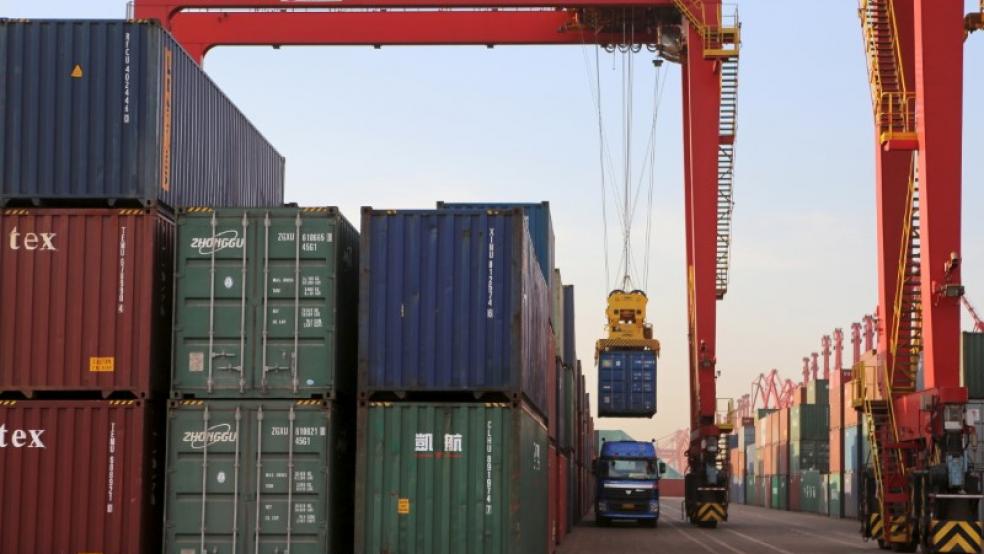HONG KONG/SHANGHAI (Reuters) - China's yuan jumped in offshore trade on Monday on suspected intervention by Beijing just hours before the International Monetary Fund's decision that is expected to grant the currency global reserve status, while Chinese stocks recovered heavy earlier losses.
The offshore yuan
opened at 6.4515 per dollar, its lowest level in 3 months and priced at a deep discount to the onshore rate - a situation the central bank has resisted in the recent past after an unexpected devaluation in August had prompted market speculation of more yuan weakness.The People's Bank of China (PBOC) set the midpoint rate at 6.3962 per dollar prior to market open, and the onshore spot yuan stayed pegged to the midpoint at 6.3961.The offshore rate firmed sharply in early morning trade to around 6.42 per dollar, leading some traders to suspect state-owned Chinese banks were buying up yuan on orders from the central bank.The sharp early moves come just as the IMF looks set to approve the inclusion of the yuan in its reserve currency basket when it meets on Monday in what is seen as a symbolic coming of age for the world's second-biggest economy.The anticipated approval will place the yuan on a par with the U.S. dollar <.dxy>, Japanese yen , British pound and euro , although corporates have shown increasing reluctance to hold yuan assets given expectations of further easing in China and imminent interest rate hikes in the United States. That has led the offshore yuan market - which is not bound by the central banks' guidance rate - to consistently price in more downward pressure on the currency going forward, leaving the PBOC grappling to manage market expectations in line with its desire to hold the exchange rate stable."The spread between offshore and onshore markets is still large even after the suspected intervention," said an onshore yuan trader at a foreign bank in Shanghai, adding that strong dollar appetite by corporates in the onshore market was also pushing down the exchange rate.Traders believe the central bank will not allow the spread between onshore and offshore yuan spot rates to widen much especially hours before the IMF's landmark decision.In a staff report issued shortly before China devalued the yuan on Aug. 11, the IMF said deviations between the offshore and onshore rates raise potential operational issues as offshore rates cannot be used as a perfect hedge for onshore-based exposure. China's stock market, which slumped over 5 percent on Friday in its worst performance since the summer crash, witnessed a highly volatile session.The main indexes plunged over 3 percent in early afternoon trading but bargain hunters managed to lift the gauges into positive territory. [nL3N13M2K]The blue-chip CSI300 index <.csi300> closed up 0.3 percent, to 3,566.41, while the Shanghai Composite Index <.ssec> also gained 0.3 percent, to 3,445.40 points."I'm not very pessimistic," said Wang Yu, analyst at Pacific Securities in Beijing. "The market may go down further this week, but I don't expect to see the kind of rout we saw in the summer. The government needs a stable market in order to resume some basic functions of the market and push for further financial reforms."But some investors are more bearish.Jasmine Huang, Senior Portfolio Manager at Columbia Threadneedle Investments, said there is a large overhang with the government having purchased almost 10 percent of the market in its rescue moves."It's obvious that they need to unwind these positions at some point, and this is going to hang over the market like a dark cloud in the months and years to come," Huang said.She added that the spectre of further yuan devaluation also casts a shadow over the stock market. "The Chinese currency is always a concern – if there were a subsequent substantial currency devaluation, then we are going to see a repeat of what happened in August when the Chinese market fell precipitously." The yuan has been hampered by speculation among some market participants that Beijing may allow the currency to depreciate soon after its admission into the IMF's basket and may feel less pressure to push through promised reforms. [nL1N13E1BY] Hong Kong stocks were relatively calm on Monday. The Hang Seng index <.hsi> dipped 0.3 percent, to 21,996.42, while the China Enterprises Index <.hsce> lost 0.7 percent, to 9,790.64 points. (Additional reporting by Lu Jianxin, Sam Shen and the Shanghai Newsroom; Editing by Shri Navaratnam & Sam Holmes)



